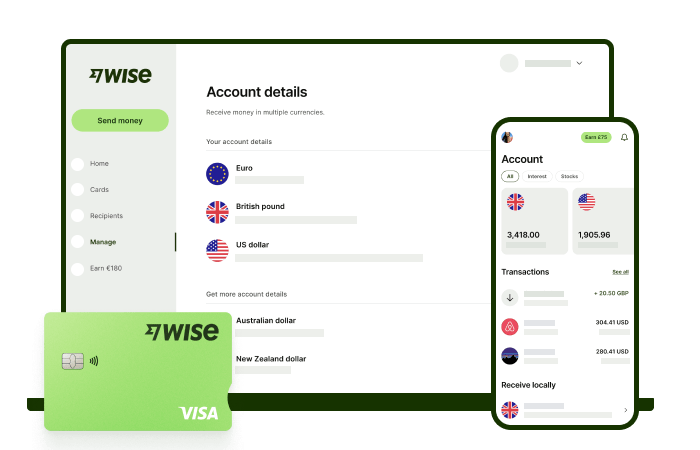Walgreens money order: Fees, limits, and instructions
Here’s everything you need to know about sending money orders with Walgreens. We cover fees and costs, limits, and how to fill one out. Read on to learn more.

Moving to Europe? Catherine Treyz, writer and American abroad, breaks down 5 important tips that will help set you up for financial success.
Many Americans now live in Europe, residing further from their beloved “purple mountain majesties” and closer to Alpine mountain landscapes.
And while it’s difficult to determine exactly how many Americans reside across the Atlantic Ocean — the United States Census Bureau doesn’t count all expatriates — one thing is certain: Living in Europe can be expensive.
Here are 5 financial tips for Americans who, whether for temporary or permanent purposes, currently call Europe home:

It sounds obvious, sure, but no matter what your situation is, it’s important to acknowledge it and understand it.
Routinely doing so will allow you to best manage your savings and/or earnings.
Ask yourself: Are you in Europe for a just a few months? Are you staying for several years or even longer? Or, quite possibly, are you just not sure? Do you want to be flexible for future moves elsewhere and put down some roots in Europe? Are you a student, freelancer, or salaried employee?
Like each individual European country, each American’s situation abroad is unique. Grasping it will help you make the right decisions, financial and otherwise, for your purposes. For example, if you are staying temporarily, less expensive travel health insurance may be your best option. But, if you’re staying longer, you will likely want to — and maybe even be legally obligated to in some countries — enroll in a national public or private health plan.

Be prepared to dip into your personal savings in Europe and be ready to continue saving.
By acknowledging your residence permit situation, you may realize you’re eligible for part-time work or freelancing to get additional savings. Or, you may learn how to become eligible for side gigs.
Yes, some European countries and cities are much more affordable than others (the European Commission has a helpful website to understand the variety of financial landscapes in European Union countries), but you could wind up spending a lot on things like a new apartment lease, public transportation, new cell phone plans, various insurances, language courses, visa/residence permit applications, translators, accountants, and another new apartment lease when you discover the first one came with a noisy, night owl neighbor.
Anna, a planetarium specialist who lives in Germany, explains that one third of her income goes to savings and travel.
“I want to also have [my personal savings and travel savings] built up in case there’s a family emergency and I have to get a last second flight back to the States.”
In other words, like in the States, it’s important to budget for the unexpected.
Also, certain American comforts are more expensive here due to import/export taxes. If, for example, you’re prone to cravings for peanut butter and jelly sandwiches, get ready to spend close to 10 euros for your favorite jar of Jif or Skippy peanut butter (I have).

Anna explains that she gets paid once per month in euros for her job, and that the different pay schedule took some adjustment for her, as she was used to getting paid every two weeks in the States.
Many others, especially freelancers, do not get paid on consistent schedules and maybe even have American or other international clients.
Also, it’s important to note that not all EU countries use the euro, like the koruna in the Czech Republic or the krone in Denmark. In non-EU countries, expect their local currency. In both cases, it’s helpful to follow the valuation, especially if you plan to exchange currencies, withdraw cash from foreign accounts, or when to send money.
To access to your American savings and any international income, you’ll want to look into transferring that money into your European account. Wise cuts out the hidden fees that are often associated with traditional bank or wire transfers. With just a few clicks, Wise provides both an affordable and quick alternative to traditional bank transfers. Wise can also help you send money from Europe to the USA.
Additionally, Wise now provides borderless accounts that allow account holders to receive and convert currencies in one place.

When I moved to Germany, I had just one sip of my first Berliner Pilsner before other Americans in my dinner group were telling me about the intricacies of FATCA.
FATCA stands for the Foreign Account Tax Compliance Act. Essentially, it requires all American citizens and Green Card holders report their foreign earned income and other holdings in foreign accounts to the Internal Revenue Service (IRS). FATCA has also increased the range of what can be taxed. In other words, if not managed properly, it could get expensive tax-wise, but then again, so could the penalties if you don’t report your earnings.
While many countries also have joint taxation treaties with the US government to limit double taxation, it is highly recommended to speak with a tax adviser to better understand how you may be affected.

Public transportation is often cheaper and more available than in the US.
Trev, an American PhD student who has lived in several European countries, says:
“Transportation is one of the big areas where people tend to lose a lot of money. [People] don’t think clearly which [public transportation] ticket they need.”
For example, if your city has different zones, there’s no need to buy a monthly ticket with access to all of them, but rather just the zone(s) you expect to frequent the most.
It’s also likely public transportation will be a cheaper option than buying or leasing a car. You may even want to consider using a bike for your basic commutes.
Continental Europe also has excellent rail systems. If you expect to travel a lot for business or pleasure, look into national or more expansive railcards. If not, for both air and train travel, it’s still advisable to book in advance for the best fares.
*Please see terms of use and product availability for your region or visit Wise fees and pricing for the most up to date pricing and fee information.
This publication is provided for general information purposes and does not constitute legal, tax or other professional advice from Wise Payments Limited or its subsidiaries and its affiliates, and it is not intended as a substitute for obtaining advice from a financial advisor or any other professional.
We make no representations, warranties or guarantees, whether expressed or implied, that the content in the publication is accurate, complete or up to date.

Here’s everything you need to know about sending money orders with Walgreens. We cover fees and costs, limits, and how to fill one out. Read on to learn more.

Here’s everything you need to know about sending money orders with Wells Fargo. We cover fees and costs, limits, and how to fill one out. Read on to learn more.

Wondering if you can send money from PayPal to Wise? In this article, we'll cover the possibilities.

Making a payment overseas? Learn about the international wire transfer limits at Discover and the fees that may apply.

Can you send money from Venmo to Wise? Find out in this guide.

Can you send money from Wise to PayPal? Find out in this guide.